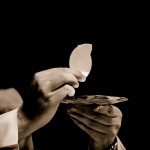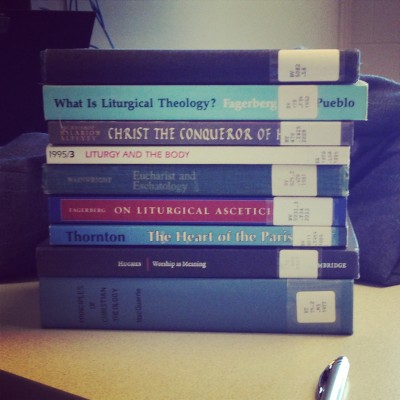O God, whose blessed Son made himself known to his disciples in the breaking of bread: Open the eyes of our faith, that we may behold him in all his redeeming work; who lives and reigns with you, in the unity of the Holy Spirit, one God, now and for ever. Amen.
As I was preparing my sermon notes for the Third Sunday of Easter, I was struck by the Collect. It recounts how the Risen Lord revealed himself to his followers through the breaking of bread. Specifically, though not exclusively, this is a reference to Luke 24 when Jesus walked the road to Emmaus with two disciples, who did not recognize him until he took, blessed, broke and gave them bread. I think the revelation of Jesus through the breaking of bread and our weekly celebration of the Eucharist calls us to something great.
We are called to the Eucharistic Life.
New Testament Witness
Every biblical account of the Eucharist provides the same basic structure: bread was taken, thanks was given, the bread was broken and then given.
The Synoptic (Matthew, Mark, Luke) accounts of the Last Supper are similar, but John’s Gospel does not contain the Last Supper; instead John connects Jesus’ words of institution with the feeding of the 5,000. In this story he “took the loaves, and when he had given thanks, he distributed them.” Jesus then says, “I am the bread of life,” which Paul Bradshaw explains as a possible variation of “This is my body.” He writes, “Several scholars have already suggested that this latter statement is John’s version of the saying over the bread at the Last Supper.” (Bradshaw, Reconstructing Early Christian Worship, p. 4)
In 1 Corinthians 11 recounts Jesus’ words and actions during the Last Supper. Paul records that which had been handed down to him. Paul places the meal in the context of the crucifixion and resurrection: “On the night he was betrayed…Jesus took a loaf of bread, and when he had given thanks, he broke it and said…” This summary has provided the foundation for Eucharistic prayers since the time of the Didache and The Apostolic Tradition.
The same structure was recorded in Acts 27 when Paul celebrated the Eucharist as he was sailing to Rome as a prisoner.
During the Last Supper, Jesus instituted four key actions (and corresponding words) that have been modeled and replicated in Eucharistic offerings for 2,000 years. These four words form the foundation of the Eucharistic life.
The Eucharistic Life
If the Eucharist is both “the sacrament of the Kingdom” (Schmemann, The Eucharist, p. 28) and the sacrament that constitutes the church, and if in the Eucharist the church is not doing church but is doing the world the way it was meant to be done (combination of Alexander Schmemann and Aidan Kavanagh) then the Eucharist has meaning for the entirety of our lives. To live the Eucharistic life is to live a life that is taken, thanks-given, broken, and shared.
Taken
“Take my life and let it be,” O Lord! We offer our lives up unto the Lord that he might take them, consecrate them, and send us out with purpose. The act of offering is an act surrender and reverent submission to the triune God.
The Eucharistic life offers not just us but creation as well. Jesus took the bread and the wine, the most common food and drink in the world, and in so doing he celebrated the goodness of God’s creation. He did not comment about the nature or quality of the bread and wine, nor did he suggest that they were somehow bad because they were material. Instead he took the elements and transformed them in an act of oblation. “All things come of thee, O LORD, and of thine own have we given thee.” We are called to stewardship in God’s Kingdom as we recognize that God is the creator, sustainer and owner of all things.
Thanks-given
Eucharisteo means “the giving of thanks.” The Eucharistic life is one that recognizes the kindness and generosity of God in all things; it is a life that overflows with gratitude for God’s redeeming work throughout human history and above all in Jesus. In both the Eucharist and the Eucharistic Life we celebrate “the memorial of our redemption,” through our “sacrifice of praise and thanksgiving.” Our very lives proclaim the grace of God which leads us to a lifestyle flavored with gratitude, thanksgiving, and adoration. May we be the kind of people for whom the Doxology is ever on our lips. “Praise God from whom all blessings flow. Praise him all creatures here below. Praise him above ye heavenly host. Praise Father, Son and Holy Ghost.”
Broken
Brokenness always comes with a purpose. Christ was broken that we might share in his eternal life and kingdom. We are broken that Christ may live in us. The bread was broken and the wine poured out that all may share in the feast. “Christ our Passover has been sacrificed for us. Therefore let us keep the Feast.” Jesus taught that a kernel must fall to the ground and die that it may be opened up and give new life.
To be broken does not require tragedy or great loss—indeed I pray that you never have to suffer such sadness. Rather, to be broken is to daily die to self and to rise to life in Christ; it is to pray that the Holy Spirit would convict us of our sinfulness and transform us daily into Christ’s likeness. It is to walk humbly before our God. It is to show the world that the only reason we can be an Easter people singing “Alleluia” is because we were first a Good Friday people shouting “Crucify him!” (Pope John Paul II)
Shared
When we live the Eucharistic Life, our desire to share the Good News flows from our gratitude. It is to be always pointing people back to the One who is worthy of our praise and thanksgiving. We are distributed to the corners of the earth that others may, “Taste and see that the Lord is good.” We are shared not for our own glory but for the glory of God and for the life of the world.
The Eucharistic life is not for the faint of heart. We go back to the Altar weekly to partake of Christ’s self-oblation that we might receive spiritual nourishment and encouragement for the pilgrimage that we might:
Serve them with the very substance of your life. Paint them a picture of the Kingdom, weave them a shawl of love, sing them a Psalm of praise, write them a sonnet of promise, play them a symphony of grace, build them homes of compassion, mold them a pot of mercy. Demonstrate the Resurrection to them with your words and your actions to tell them that He loves them.
– The Rev. Canon Ellis E. Brust, Church of the Apostles, Kansas City
Jesus’ life was taken by God and consecrated. It was a life that constantly gave thanks to the Creator. It was a life broken by sin and the cross. It was a life shared with all that we might come to know God. The call of discipleship is the call to follow Him and live the Eucharistic Life.











